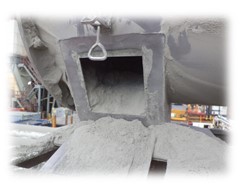 To help answer this question, NFPA has released NFPA-652 and 654. A combustible dust is defined as a finely divided combustible particulate solid that presents a flash fire or explosion hazard when suspended in air or the process-specific oxidizing medium over a range of concentrations. Basically, what this means is when the dust is in the air and its concentration is enough to cause a flash fire or propagate a deflagration or explosion if exposed to a spark or heat source, then it’s considered combustible.
To help answer this question, NFPA has released NFPA-652 and 654. A combustible dust is defined as a finely divided combustible particulate solid that presents a flash fire or explosion hazard when suspended in air or the process-specific oxidizing medium over a range of concentrations. Basically, what this means is when the dust is in the air and its concentration is enough to cause a flash fire or propagate a deflagration or explosion if exposed to a spark or heat source, then it’s considered combustible.
Combustible Dust Testing
Unless you know for sure that your dust isn’t combustible, you should send the dust sample to a lab for testing. The lab will provide one of three responses – no reaction, combustible but not propagating, or propagating. 
Usually the lab will initially do a Go/ No-Go test. If the dust doesn’t exhibit combustion, the testing will stop. If it does exhibit combustion, they will then do further tests and provide explosion properties ( Kst and Pmax) of the dust. The Kst tells you how quickly the explosion will propagate, while Pmax tells you the power behind the event.
Common Knowledge about Combustible Dust
- A combustible dust mixed with non-combustible dust may or may not pass the go / no-go test; therefore, if you have both in a mixture, get a test.
- Material that may not burn can still be combustible as a dust, unless you know for sure, getting a test is the safe bet.
- If you have made a process change that changes the composition, relative concentrations, etc. of the dust, then the combustibility of the dust may have changed and a new test should be done.
- If you have combustible dust in your facility, then a hazard analysis of the area must be done every five years.
Dust Collector FAQ Volume 1
To make life easier, we have put together some common questions we get asked along with answers and explanations. Have a look.
To learn more about which dust collector, please contact our experts at 440-543-7400 or visit our website: www.dustcollectorhq.com.
To improve efficiency and safety, there is no substitute for an on-site inspection by an experienced expert. Click below to start with a free 20-minute phone consultation by clicking the button.


